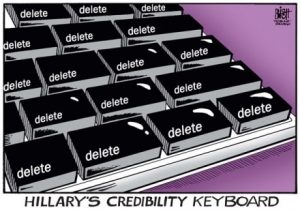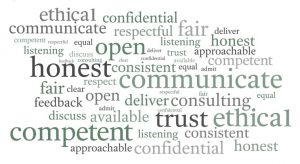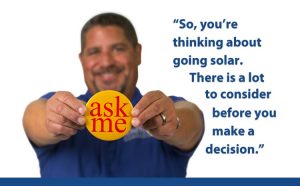We’re still a year away from the 2016 presidential election, but I’m ready for it to be over. The non-stop, clown-car cacophony of debates, news cycles, spin, polls, charges, counter charges, and breathless (sometimes brainless) commentary about who’s up and who’s down today has worn me out.
I have no partisan loyalties and I’m not energized by any of the candidates. Amidst the blather and bluster of this presidential campaign, I see several important lessons for utility communicators and marketers.
Three particular non-partisan lessons jump out at me:
- Distrust dies hard (e.g., Hillary Clinton)
- People are still mad as hell (e.g., Donald Trump, Bernie Sanders)
- You have to be liked before you will be heard (e.g. Ben Carson)
Today, I will focus on distrust dying hard. Stay tuned for my take on the other topics in the near future.
Origins of Distrust
Democratic candidate Hillary Clinton has a trust problem. Duh. And thinking about her trust problem reminded me of a verbatim comment I once heard from a customer of a large Southwestern utility: “I’ve always hated you – I don’t know why, I just did.”
Sounds like a formidable problem to overcome, but this utility did, over time and with conscious, focused effort. It seems candidate Clinton is trying to restore trust by connecting with people on a face-to-face, emotional level.
For me, candidate Clinton’s trust problem derives half from her name and half from her behavior. First, her namesake. For voters over a certain age, any presidential candidate named “Clinton” inevitably brings to mind the endless scandals that engulfed President Bill Clinton and First Lady Hillary Clinton during the 1990s. I voted for him twice, and since leaving office Bill Clinton has done some wonderful things through his foundation. But his presidency was scandal plagued, and some of that inevitably splashes back on Mrs. Clinton.
 Now as she once again occupies the limelight – this time as a presidential candidate — Hillary Clinton is doing plenty of things to make people wonder about her trustworthiness such as flip-flopping on a number of issues like the Trans-Pacific Partnership and Keystone XL pipeline. Her tortured explanations about her use of a private email server while she was secretary of state still hang over her candidacy and keep her trust problem alive and kicking.
Now as she once again occupies the limelight – this time as a presidential candidate — Hillary Clinton is doing plenty of things to make people wonder about her trustworthiness such as flip-flopping on a number of issues like the Trans-Pacific Partnership and Keystone XL pipeline. Her tortured explanations about her use of a private email server while she was secretary of state still hang over her candidacy and keep her trust problem alive and kicking.
 People don’t trust the Clintons for the same reason they don’t trust the New England Patriots football team: They’re habitual line-steppers. Writing about “Deflategate,” USA Today columnist Nate Scott opined: “Everyone thinks the Patriots cheated. And the Patriots only have themselves to blame. But here’s the thing, when all those small to medium things add up, that constant flirting with the line, you get a reputation.”
People don’t trust the Clintons for the same reason they don’t trust the New England Patriots football team: They’re habitual line-steppers. Writing about “Deflategate,” USA Today columnist Nate Scott opined: “Everyone thinks the Patriots cheated. And the Patriots only have themselves to blame. But here’s the thing, when all those small to medium things add up, that constant flirting with the line, you get a reputation.”
“The Patriots earned this (distrust),” Scott continued. “They stepped over the line so many times that their credibility is gone. People will always think they’re cheating now, no matter what. Until Bill Belichick and Brady are gone, or until the Patriots lose 10 games a season and no one cares about them, people will think the Patriots are cheating.”
Communications tip of the month: Don’t be a hair-splitter or a line-stepper. Understand that trust is the essential foundation of a functioning society. Invest time, effort and money to maintain it. Or be prepared to pay a lot more, for a lot longer, to try to restore trust.
Of course, the best way to restore trust is to never lose it in the first place. As Warren Buffet said, “It takes 20 years to build a reputation and five minutes to ruin it. If you think about that, you’ll do things differently.” There’s a reason why Buffet, CEO of Berkshire Hathaway, is called the Oracle of Omaha.
Rebuilding Trustworthiness
 Rebuilding your reputation as a trustworthy person or institution is a time-consuming process that must be done on a retail basis. Too many businesses and politicians learn that valuable lesson after they do something to destroy the public’s trust. Ask Volkswagen. And some violations of trust cannot be repaired. Ask Enron.
Rebuilding your reputation as a trustworthy person or institution is a time-consuming process that must be done on a retail basis. Too many businesses and politicians learn that valuable lesson after they do something to destroy the public’s trust. Ask Volkswagen. And some violations of trust cannot be repaired. Ask Enron.
Trust-Restoration: One Utility’s Experience
The Southwestern utility that was so distrusted by one of its customers did the smart thing and went back to the drawing board. They recognized they had a problem, and that it would take a long time to fix it. They crafted a trust-restoration plan and worked to carry it out. It wasn’t really complicated. In fact, it was straight out of Business 101: Interact – directly and personally – with your customers. Again, duh. One part of that plan was reaching out to the customer segments that least trusted the utility. In this particular case, it was low-income Hispanic residents.
One way that utility rebuilt trust with that particular community was to reach out to first-time homebuyers, many of whom were Hispanic. In the evenings, it held “first-time homeowner” workshops in English and Spanish that covered the ins and outs (many of them financial) of home ownership. It wasn’t trying to sell anything, or spin an issue. It was providing information on an issue of great importance to customers.
After one of those workshops, the customer that always hated their utility, but didn’t know why, told a representative of that utility: “After your talk here tonight, I will be happy to pay my bill. Thank you for being friendly and honest with us.” A similar sentiment was expressed by a different customer at another workshop: “Thank you for coming here and telling us the truth. You put a face and a name on a very big company.”
Right Message, Right Messenger
 Successful communications requires an adroit blend of “message” and “messenger.” The best message can be undermined by choosing the wrong messenger. And the best messenger will not be successful if he or she has a weak or ineffective message. Think of communications as an exercise in yin-yang, and you will be more successful.
Successful communications requires an adroit blend of “message” and “messenger.” The best message can be undermined by choosing the wrong messenger. And the best messenger will not be successful if he or she has a weak or ineffective message. Think of communications as an exercise in yin-yang, and you will be more successful.
That’s exactly what Roseville Electric in California is doing. That utility, a client that has extremely high levels of customer satisfaction and customer trust, decided it was going to educate its customers on rooftop solar, one of the most controversial and confusing issues utilities face. To help them do that, they designated one of its employees, David Dominguez, to be the utility’s face and voice on the issue.
While some utilities are in effect hiding from the public on rooftop solar, Roseville Electric has chosen a path that is transparent and that enhances its customer trust. Seeing David’s face and having his contact info easily available on Roseville Electric’s website boosts the utility’s credibility. That’s just good business sense.
Roseville Electric’s choice is particularly wise because it is so well-trusted by its customers. It also has extremely high customer-satisfaction scores. So unlike Hillary Clinton, the New England Patriots and Volkswagen, Roseville Electric is starting from a position of strength, and it is building on it. Maybe some utilities would have decided to rest on their laurels, coast a bit and not put themselves out on rooftop solar. But not Roseville Electric.
The late Stephen Covey, author of The 7 Habits of Highly Effective People, once said, “Trust is the glue of life. It’s the most essential ingredient in effective communication. It’s the foundational principle that holds all relationships.”



